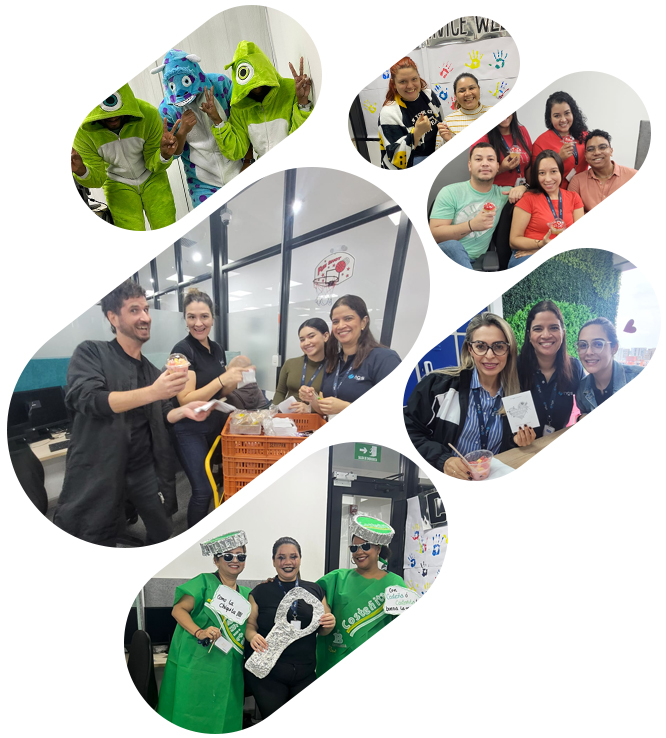
Entering a job interview can be like entering the unknown, but it doesn't have to be. By preparing for the most frequently asked job interview questions, you can confidently walk into the interview, present your best self, and leave a lasting impression.
Whether you're interviewing for a role in finance, customer service, or a call center in Colombia, being prepared can be the difference between getting the job and not.
This blog summarizes the most common interview questions that hiring managers often ask and offers guidance on how to answer them well. It covers common interview questions and answers to help you ace your next job interview.
Top Interview Questions You’re Likely to Be Asked
Although each interview is different, there are some common interview questions that most hiring managers use to learn about your personality, aspirations, and credentials. These top interview questions and answers will help you respond effectively and confidently. The following are some of the most common job interview questions and how to answer them.
Tell Me About Yourself
This is usually the first question, establishing the interview's tone. Answer it professionally, briefly, and with relevance to the position.
Pro Tip: Use the present-past-future formula. Begin with your current activities, proceed to experience, and finish with your future goals.
Example: "I am currently a customer support specialist at XYZ Co., overseeing a staff of 10. Previously, I worked for three years in technical support. I am now looking for a position where I can expand my leadership abilities further, preferably in a lively call center setting such as yours."
This is a classic question in the top lists of most common job interview questions.

Why Do You Want to Work at This Company?
Interviewers need to know you've done your homework on the company and are interested:
- Reference company values or recent success.
- Connect your skills and objectives with the mission of the company.
Don't say, "It's a great place to work." Instead, say, "I am impressed with your dedication to innovation and customer service." My experience aligns well with your mission.
This is one of the most common interview questions where preparation is rewarded.

Why Are You Leaving Your Current Job?
Be truthful, but remain upbeat. Do not badmouth your present employer.
Rather than: "My boss is horrible."
Attempt: "I’m looking for new challenges and a role that allows me to grow professionally within a collaborative environment."
This question is on virtually every list of job interview questions and answers, so practice your answer beforehand.
Why Should We Hire You?
This is your moment to pitch yourself. Highlight your particular mix of experience, ability, and passion.
Organize your response:
- Review the job description
- Highlight relevant skills or achievements
- Describe how you can contribute to the team
Example: “With five years of call centre experience, excellent conflict resolution skills, and a history of exceeding KPIs, I’m confident I can contribute immediately.”
What Is Your Greatest Professional Achievement?
This is an opportunity to showcase your contributions and value. Use the STAR framework (Situation, Task, Action, Result) to frame your account.
Example: "In my previous role, I spearheaded a team effort to decrease call handling times. Introducing a revised script and CRM training reduced average handling time by 15%, lifting customer satisfaction levels."
This question is among the most common interview questions and how to answer them.
Where Do You See Yourself in Five Years?
Employers would like to know whether your ambitions are compatible with the job and if you envision long-term growth with the company.
Answer this by demonstrating ambition without losing sight of reality.
Example: “Within five years, I would like to develop into a customer experience supervisory position, preferably in a firm that believes in internal promotion, such as yours.”

Why Did You Leave Your Last Job?
Like "Why are you leaving your present job?", this question must be answered diplomatically.
Emphasize future development, alignment, or career direction change, not dissatisfaction or conflict.
Example: "I left to seek new challenges and experience exposure to a more client-focused arena."
This is one of the most commonly asked interview questions and should be handled carefully.
How Do You Handle Stress and Pressure?
Stress is not avoidable. Employers prefer to know if you can handle it productively.
Tips:
- Give an example of a high-pressure moment and how you handled it.
- Highlight planning, communication, or mindfulness strategies.
Example: “During busy seasons, I use careful planning and frequent team check-ins to keep on top of tasks and avoid burnout.”

Tell Me About a Time You Faced a Challenge at Work
This is another opportunity to apply the STAR method.
Be specific. Select an experience where your initiative resulted in a positive outcome.
Example: "We once had a system downtime during a large promotion. I took it upon myself to track orders manually and inform customers proactively, which helped the team retain over 90% of sales."
Do You Have Any Questions for Us?
“Yes”. Always prepare thoughtful questions.
Good questions to ask:
- What is a typical day like?
- How do you define success in this position?
- Could you tell me more about the team I’ll be working with?
It demonstrates that you're interested and serious about the position. Learn more about call center jobs on our HGS blog platform.
Conclusion
Preparation is your best asset when sitting for an interview. By preparing thoughtful, genuine answers to these most popular interview questions, you can walk into the interview with clarity and confidence.
Remember, interviews are not only about impressing the company but also about ensuring the job matches your needs.
If you're looking to enter your first career position or make a move to advance in call center jobs, especially in Colombia, mastering these key questions will give you a decisive advantage. At HGS Colombia, we seek motivated individuals who are ready to grow in a dynamic, people-first environment.
Frequently Asked Questions (FAQs)
What are the three fundamentals of interviewing?
The three essentials are clarity, confidence, and communication. Be clear, confident, and sincere in your responses.
What are the four best interview practices?
The four best interview practices are researching the company, practicing common questions, dressing appropriately, and following up with a thank-you email.
What five things are judged in an interview, and how?
Interviewers assess communication, professionalism, confidence, problem-solving skills, and cultural fit. They do this by asking behavioral questions and observing your body language.
What is the SMART method of interviewing?
SMART is an acronym for Specific, Measurable, Achievable, Relevant, and Time-bound. Use it to frame your achievements and objectives when answering questions.
 Colombia
Colombia Canada
Canada India
India Jamaica
Jamaica Philippines
Philippines UK
UK US
US SA
SA
